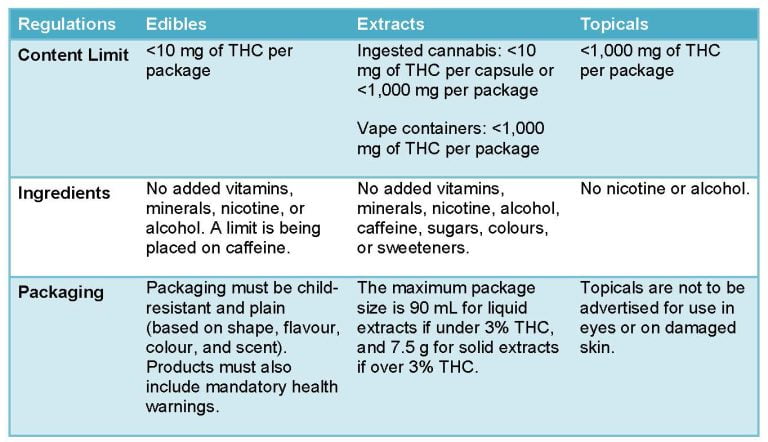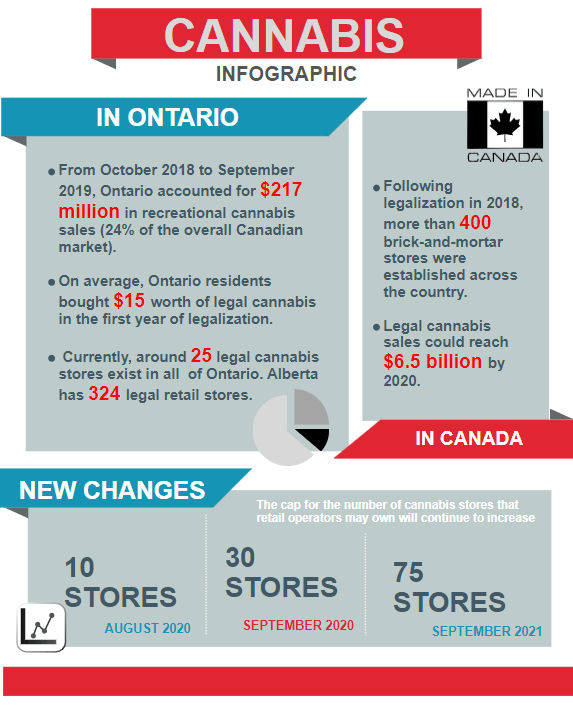For cannabis retail operators in Ontario, Christmas came early this year when the Ontario government announced that it would be scrapping the widely-criticized lottery system for awarding cannabis retail store licenses and lifting the cap on the number of store licences available. Now, Ontario is set to drastically expand its cannabis retail footprint as this policy brings an open cannabis market to Ontario for retail operators.
Attorney General Announces Open Cannabis Retail Market
On December 12, 2019, Attorney General Doug Downey announced that the Ontario government would be removing the temporary cap on the number of private cannabis stores in the province and eliminating the pre-qualification requirements for prospective retailers.[1] In addition, retailers will also be permitted to sell additional cannabis-related items, such as cannabis-related magazines and cookbooks.
Previously, the Ontario government imposed a temporary cap of 25 retail store authorizations across Ontario. Prospective retailers were also required to submit the following pre-qualification documents: (i) confirmation from a bank or credit union that it had financial capacity to obtain $250,000 in cash or cash equivalents; (ii) confirmation that the retailer could obtain a letter of credit for $50,000 within five business days; and (iii) confirmation that the retailer had secured a suitable retail space. All of these pre-qualification requirements are to be scrapped by January 6, 2020.[2]
The stated purpose of these changes is to increase the ability of licenced producers in Ontario to participate in the retail market. Currently, Ontario has only 25 legal cannabis stores. Alberta, by comparison, has 324 retail cannabis stores.[3] Despite this, cannabis retailers in Ontario sold the most cannabis of any province in Canada in the first year following legalization. Ontario accounted for $217 million in recreational cannabis sales—which represents 24% of the overall Canadian market—from October 2018 to September 2019.[4] Against this backdrop, Ontario’s new policy change is likely to create drastic growth in the cannabis retail market.
Key Dates to Watch
The Alcohol and Gaming Commission of Ontario (“AGCO”) will begin accepting operator licence applications from prospective retailers on January 6, 2020, followed by store authorization applications on March 2, 2020. Store authorizations from this open application process are expected to be issued beginning in April, at an initial rate of approximately 20 per month.[5]
 Figure 1. A timeline of the key dates to watch in 2020 when the AGCO begins accepting applications.[6]
Figure 1. A timeline of the key dates to watch in 2020 when the AGCO begins accepting applications.[6]
The same restrictions on retail store authorization will continue to apply. At the initial application stage, the AGCO will be screening for certain cannabis-related convictions or known connections with organized crime and refusing these applications. Applicants who pass this stage can then apply to open a cannabis store at a specific address after March. The store locations may or may not be approved, depending on whether they meet certain conditions, such as being at least a certain distance from schools and whether there are objections from other members of the community.[7] Ontario municipalities had until January 22, 2019 to inform the AGCO if they wished to opt-out of having cannabis retail stores in their communities.[8]
Retail operators will be capped at owning a maximum of 30 cannabis stores across Ontario in 2020, with the option to have as many as 75 by September of 2021.[9] This is a significant hike from the previous limit of 10 cannabis stores.
Cannabis Derivatives
January 6, 2020 will also mark the date that the first retailers in Ontario will receive the new “derivative cannabis products.”[10] On October 17, 2019, amendments to the federal Cannabis Regulations came into force and permitted authorized distributors and retailers to sell cannabis edibles, cannabis extracts, and cannabis topicals.[11] Although it was anticipated that these new products would hit the retail market by mid-December, there have been delays in this roll-out in Ontario, Quebec, and Alberta. The early January date will now align with the opening of the cannabis retail market in Ontario.
In the other Canadian provinces, recreational edible cannabis products, including baked goods, beverages, cotton candy, dissolvable strips, and gummy candies, are now available for purchase online and in stores. A recent Deloitte report suggests that edibles and alternatives will be worth $2.7 billion a year in Canada, which would make up 60% of the legal cannabis market.[12] This suggests that edibles and extracts could become the fastest-growing segment in the cannabis market.
The chart below summarizes some of the regulations surrounding packaging and dosage for these derivative cannabis products:[13] Impact on the Commercial Leasing Market
Impact on the Commercial Leasing Market
This recent announcement is the latest in the series of policy decisions by the Ontario government that have kept prospective cannabis retailers and landlords on their toes.[14] While January 6 is only a few weeks away, the removal of the pre-qualification requirement that prospective retailers must secure a retail space will curtail some of the late season scrambling to obtain leases before the new year. For the would-be cannabis operators that did not obtain a licence in the July 2019 summer lottery process but continued to pay into their commercial leases, relief may finally be in view.
With a shift in the market towards retail storefront distribution, the demand for commercial leases in the retail cannabis space will only continue to escalate. Landlords should carefully consider whether retailers in this emerging industry will be a good fit for their properties and, if so, what their position is on issues such as insurance, termination rights, utility usage, and security measures. Landlords should also review existing leases and consider appropriate amendments. Once the new “derivative cannabis products” enter the retail market, landlords should make sure that the use clauses and any restrictive covenants in new and existing leases are clear about what exactly can be sold and/or consumed on the leased premises. Both landlords and tenants should consider inserting appropriate conditions into any offers to lease and leases for recreational cannabis stores. For additional information on this topic, please see our article from November 2016, Don’t Let Your Development Go to Pot! Tips for Leasing to Marijuana Retailers.
Back in November 2017, Alberta made the decision to allow private cannabis outlets to operate as licenced retail stores. This decision proved to be a boon for the commercial real estate industry in Alberta. The rush to secure retail spaces was likened to the “Wild, Wild West of Cannabis” in Alberta, as retail brokers received hundreds of calls every week from tenants seeking to rent anywhere between 1,200 to 3,000 square feet of retail space to set up cannabis stores.[15] If Ontario can take a chapter from its westerly neighbour’s playbook, it looks like Ontarians will be having a green Christmas this year!
 Figure 2. An infographic of cannabis statistics in Ontario and Canada from September 2018 to December 2019.[16]
Figure 2. An infographic of cannabis statistics in Ontario and Canada from September 2018 to December 2019.[16]
[1] “Ontario Opening Cannabis Retail Market: Province helping build safe and convenient retail system to combat illegal market” (12 December 2019), online: Service Ontario <https://news.ontario.ca/mag/en/2019/12/ontario-opening-cannabis-retail-market.html?utm_medium=email&utm_campaign=SUBSCRIBERS-Cannabis-Announcem&utm_source=Envoke-English&utm_keyword=Ontario-Government-announces-m> [Ontario Government Announcement].
[2] “Pre-qualification documents required for Cannabis Retail Store Allocation Lottery”, online: Alcohol and Gaming Commission of Ontario <https://www.agco.ca/cannabis/pre-qualification-documents-required-cannabis-retail-store-allocation-lottery>.
[3] Amanda Pfeffer, “Pot producers implore Ontario to open more stores” (13 November 2019), online: CBC <https://www.cbc.ca/news/canada/ottawa/pot-producers-implore-ontario-open-stores-1.5357101>.
[4] Vanmala Subramaniam, “Ontario sold the most cannabis in first year of legalization, despite low store count” (11 December 2019), online: Financial Post <https://business.financialpost.com/cannabis/cannabis-business/ontario-sold-the-most-cannabis-in-first-year-of-legalization-despite-low-store-count>.
[5] Ontario Government Announcement, supra note 1.
[6] Image created on SmartDraw.
[7] Patrick Cain, “As Ontario moves to open up cannabis retail, here’s what we’ll see next” (13 December 2019), online: Global News <https://globalnews.ca/news/6289867/ontario-cannabis-store-announcement-whats-next/>.
[8] “List of Ontario municipalities prohibiting or allowing cannabis retail stores”, online: Alcohol and Gaming Commission of Ontario <https://www.agco.ca/cannabis/list-ontario-municipalities-prohibiting-or-allowing-cannabis-retail-stores>.
[9] Ontario Government Announcement, supra note 1.
[10] Amanda Pfeffer, “No cannabis edibles for Christmas in 3 provinces because of delays” (16 December 2019), online: CBC <https://www.cbc.ca/news/canada/ottawa/no-cannabis-edibles-for-christmas-1.5394312>.
[11] Cannabis Regulations, SOR/2018-144.
[12] “Nurturing New Growth: Canada Gets Ready for Cannabis 2.0” (31 May 2019), online: Deloitte https://www2.deloitte.com/content/dam/Deloitte/ca/Documents/c-and-ip/ca-en-consumer-nurturing-new-growth-en-aoda-may31.pdf at p 6.
[13] Peter Smith, “Cannabis edibles won’t be coming to Ontario until January” (16 December 2019), online: Daily Hive < https://dailyhive.com/grow/cannabis-edibles-ontario-ocs-delay-january>.
[14] For additional information, please see our articles from June 2018, Ontario Introduces New Cannabis Legislation: What You Need to Know About the Impact on Commercial Real Estate and Leasing; August 2018, Ontario Government Makes Policy U-Turn: Doug Ford’s Plan for the Private Retail Sale of Cannabis; and July 2019, Trudeau, Ford Give Canada Day Cannabis Gifts: New Rules for Edibles and Retail Licensing in Ontario.
[15] Karen Graham, “In Canada, cannabis has huge impact on commercial real estate” (20 March 2018), online: Digital Journal <http://www.digitaljournal.com/business/in-canada-marijuana-has-huge-impact-on-commercial-real-estate/article/517881>.
[16] Image created on SmartDraw.
The information and comments herein are for the general information of the reader and are not intended as advice or opinion to be relied upon in relation to any particular circumstances. For particular application of the law to specific situations, the reader should seek professional advice.
